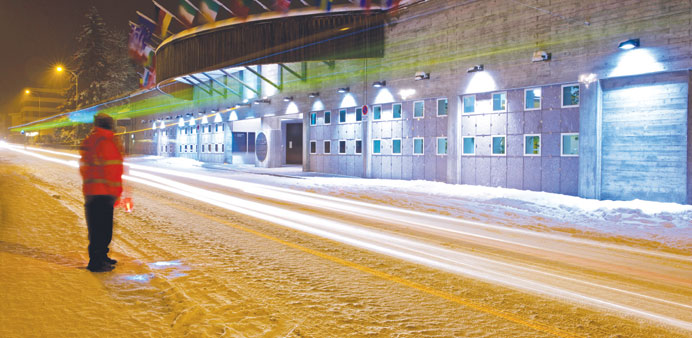A security guard monitors traffic as it passes the Kongress Zentrum (Congress Centre), the venue for the World Economic Forum (WEF) in Davos, Switzerland, and (inset) a ‘Davos Klosters’ logo sits on a road traffic sign near the Kongress Zentrum. Next week the business elite will gather in Davos for the five-day event, which starts on January 22.
AFP/Davos
Iranian President Hassan Rohani and some 40 other world leaders will gather at the World Economic Forum next week to discuss Syria’s bloody civil war and the sluggish world economy.
The annual gathering of the global political, business, academic and civil society elite at the swank Swiss ski resort Davos will aim to provide “a mirror of the world as it is”, WEF chairman Klaus Schwab told reporters.
The January 22-25 event, which kicks off on the same day as an international peace conference for Syria elsewhere in Switzerland, will count fewer world leaders than last year.
More than 40 heads of state and government are nonetheless set to figure among the some 2,500 participants who will descend on the picturesque mountain resort to discuss and debate a wide range of issues including the causes of conflicts plaguing the Middle East, and how to reinvigorate the global economy.
The forum’s aim is ambitious: Schwab said it would “look for solutions for the really fundamental issues” — the ones that pose questions about “our whole destiny as mankind”.
Faced with a world “still much too much caught in a crisis-management mode”, Schwab said the forum hoped “to push the reset button”.
Participants expected from the crisis-ridden Middle East include Rohani as well as Prime Minister Benjamin Netanyahu and President Shimon Peres of Iran’s arch-enemy Israel.
Rohani, whose country has controversially not been invited to take part in the Syria peace conference in Montreux, near Geneva, next Wednesday, is scheduled to participate in a debate in Davos the next day entitled “Iran in the World”.
George Sabra, the head of Syria’s main opposition National Council, is scheduled to be in Davos, as is Palestinian deputy prime minister Mohammed Mustafa and a large Egyptian delegation headed by interim prime minister Hazem el-Beblawi.
From outside the region, British Prime Minister David Cameron and his Japanese and Australian counterparts Shinzo Abe and Tony Abbot are expected at Davos.
Brazilian President Dilma Roussef and her Mexican, South Korean and Myanmar counterparts Enrique Pena Nieto, Park Geun-Hye and U Thein Sein are also scheduled to come.
Neither the US, China, Russia nor France will be represented at such a high level, and German Chancellor Angela Merkel, who had been expected to attend, has had to cancel after suffering a skiing injury.
UN Secretary General Ban Ki-moon, who will host the Syria conference in Montreux, will travel afterwards to Davos to address the issue of climate change, another issue figuring high on the agenda this year.

